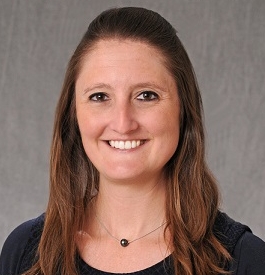Dr. Rebecca Lynch’s career in HIV research began when she was a high school student. As a student interested in biology, Dr. Lynch learned of an opportunity to run enzyme-linked immunosorbent assays (ELISA) in Dr. Pamela Kozlowski’s laboratory, at Boston Children’s Hospital, which studied antibodies to HIV. For the next few summers as a college student, she continued to work in Dr. Kozlowski’s lab and gained experience and mentorship as a laboratory technician. Looking back, Dr. Lynch believes her early exposure to laboratory research helped her understand it as a career path and visualize herself as a scientist.
As an undergraduate student at Yale University, Dr. Lynch studied Molecular, Cellular, and Developmental Biology. Eager to continue her antibody research, she earned a Ph.D. in Immunology and Molecular Pathogenesis at Emory University under the guidance of Dr. Cynthia Derdeyn. Throughout her time in academia, Dr. Lynch was involved with institutions with a Center for AIDS Research (CFAR), which solidified her quest to eventually become faculty at an institution with a CFAR. She continued her post-doctoral training under the mentorship of Dr. John Mascola at the Vaccine Research Center (VRC) at the National Institute of Health (NIH). She joined the DC CFAR as an investigator member after becoming an Assistant Professor in the Department of Microbiology, Immunology & Tropical Medicine at the George Washington University. Through the DC CFAR, she was encouraged to apply to the pilot awards programs and was funded in 2016 for her project entitled "Elucidating the commensal-HIV reactive antibody repertoire in Rhesus macaques.” Dr. Lynch went on to be awarded an NIH CFAR Administrative supplement in 2018 entitled "Implications of time to ART for antibody-based cure strategies." The pilot projects were important to her career because they provided the opportunity to practice writing and submitting proposals that could be successful at the NIH. “They provided the seed funding to get crucial preliminary data for future NIH proposals,” says Lynch, who has since received an R21 entitled “Effects of boosting mucosal immunity by microbiota manipulation on B cell responses to HIV-1 vaccine” and an R01 entitled “Quantifying the fitness cost of HIV-1 resistance to broadly neutralizing antibodies.” Dr. Lynch encourages any new or early stage investigator applying for NIH funding to talk about their ideas with people from different scientific backgrounds, receive feedback, set up collaborations, and submit as many applications as possible. “The ratio may be very disappointing, but all you need is that successful one,” she states. Currently, her work focuses on improving cure strategies, specifically monoclonal antibodies for infectious diseases. Utilizing her previous work of studying how HIV escapes normal antibody responses, Dr. Lynch now focuses on applying resistance studies to translational antibody therapies.
Her goals, however, do not stop there. Dr. Lynch emphasizes that “there is still much that remains unknown in HIV research.” As the academic lead of the DC CFAR HIV Cure Scientific Working Group (SWG), she aims to explore these paths by discovering and supporting new collaborations cross-institutionally and emphasizing community-focused research. She states, “the DC CFAR provides a unique opportunity to be a part of a community with so much diversity. As a multi-institutional CFAR, there are researchers whose primary connection to each other is through the CFAR network.” Dr. Lynch believes the DC CFAR offers the many perspectives, expertise, and ideas needed to build meaningful and impactful research. As the network continues to expand, Dr. Lynch hopes to broaden the scope of her collaborative work and find new discoveries in HIV cure research.


